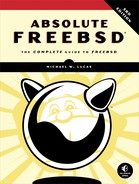FOREWORD
I am happy to write the foreword to Michael Lucas’s third edition of Absolute FreeBSD. For 15 years, Michael’s Absolute series has provided the definitive guide to BSD software, filling in the whats and whys left unexplained by the detailed but largely factual documentation. And, as its name implies, it distills to its essence the enormous volume of FreeBSD documentation so that those new to the system can get up to speed quickly.
Michael is an important contributor to the FreeBSD community. He has filled many of the roles that contributors can take: answering questions, filling in pieces of missing documentation, helping to make connections in the community, and generally identifying and facilitating the things that need to be done. Michael has interacted with thousands of people: hobbyists, professional software developers, system administrators, and university professors. Much of his real-world experience and understanding of what people are trying to get done has been distilled into this book.
I have been involved with the BSD software since its beginning in 1977 as a student project of my office mate, Bill Joy, at the University of California at Berkeley. By 1980, the BSD distributions had grown from a few programs that could be added to an AT&T UNIX system to a complete system coordinated by four people who called themselves the Computer Systems Research Group (CRSG). By 1983, the socket interface had been designed and TCP/IP had been implemented underneath it, allowing a small set of trusted external contributors to log into the CSRG development machines over the ARPAnet (which later became the internet) and directly update the sources using SCCS, a very early source code control system. The CSRG staff could then use SCCS to track changes and verify them before doing distributions. This structure formed the basis for the current BSD-based projects once BSD was spun off from the university as open source in 1992.
Starting with the open-source distribution, FreeBSD initially ran on only the early PC computers. Over the past quarter century, thousands of developers have contributed to FreeBSD to make it into a powerful network operating system with state-of-the-art features that runs on all the modern computing platforms. FreeBSD powers core internet companies worldwide. From Netflix movie distribution to WhatsApp messaging, from Network Appliance and Dell/Isilon storage products to Juniper routers, from the foundation of Apple’s iOS to the base libraries and services of Google’s Android, it is hard to throw a rock at the internet without hitting FreeBSD. However, FreeBSD is not the product of any one company, but of a large open source community: the FreeBSD Project, made up of developers, users, and countless supporters and advocates. While you can, as many people do, use FreeBSD simply as a piece of software without ever interacting with that community, you can significantly enrich your FreeBSD experience by becoming a part of that community.
Whether you are a first-time user or a kernel hacker, the resources available via the http://www.freebsd.org/ website, countless mailing lists, regional user groups, and conferences can be invaluable. Have a question? Just email [email protected], and one or more of the hundreds of volunteers will undoubtedly answer it. Want to learn more about the exciting new features coming in future FreeBSD versions? Read the Project’s quarterly status reports or development mailing lists, or attend one of the many regional BSD conferences taking place around the world.
These resources are a product of the FreeBSD Project and its community, a large number of collaborating individuals and companies, as well as the FreeBSD Foundation, a nonprofit organization coordinating funding, legal resources, and support for development work and community activities. Michael’s easy-to-use book provides a gateway for newbies to benefit from this community’s expertise and to become active users of FreeBSD themselves.
FreeBSD is open source software, available for you to use and distribute at no charge. By helping to support, advocate, or even develop FreeBSD, you can give back to the FreeBSD Project and help this community grow.
Whether you are a new user of FreeBSD or an experienced one, I am confident you will find Absolute FreeBSD a book you want to keep close at hand.
Marshall Kirk McKusick
FreeBSD Committer
Treasurer, FreeBSD Foundation
Berkeley, California
January 2018
